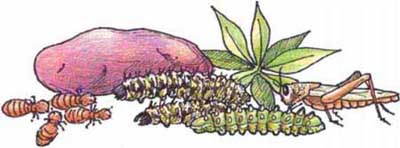|
You are going to learn about:
|
How many different foods can you think of?
How many did you
eat yesterday?
Activity 14
|
|
|
|
Muke eats food every day. |
Mule eats food every day. |
|
Muke eats a lot of food. |
Mule eats a lot of food. |
|
Muke eats the same food every day. |
Mule eats different foods every day. |
 READING
READING
|
We need many different foods every day. |
 ASK YOURSELF
ASK YOURSELF
How many different foods did I eat yesterday?

|
YESTERDAY I ate all these different foods: ...................................... ...................................... |
 REMEMBER
REMEMBER
|
Eat many different foods every day. |
 HOMEWORK
HOMEWORK
Count the number of different foods that you eat in one
day.
Tell your family how many different foods you ate.
Say why you
have counted them.
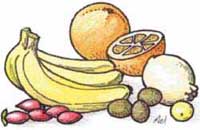
Activity 15
Look at the picture.

Which pupils have had breakfast?
Which pupils haven’t
had breakfast?
How do you know?
Activity 16
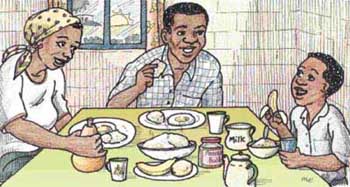
These people are having breakfast.
What do you think they
are eating?
What do you like to eat for breakfast?
 READING
READING
|
Breakfast is the first meal of the day. |
 ASK YOURSELF
ASK YOURSELF
Would I like to have breakfast every day?
Why?
What
would I like to have?
|
BREAKFAST I would like breakfast every day. |
 REMEMBER
REMEMBER
|
Eat breakfast every day. |
 HOMEWORK
HOMEWORK
A. Tell your family why breakfast is so important.
Ask how you can have a good breakfast every day.
OR
B. Plan and prepare a breakfast with your family’s help.

Extra Lesson: Chalo Needs Breakfast
Look at the picture and tell what is happening to Chalo
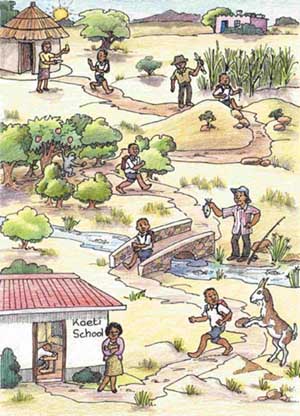
Activity 17
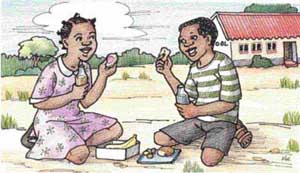
It is break time at school.
Mule is having a snack.
Muke
is having a snack.
What are they having?
 READING
READING
|
We have snacks between the main meals. |
|
|
* Snacks make us strong. |
* They help us grow. |
|
* They stop us feeling hungry. |
* They give us energy. |
|
Children need snacks. |
|
 ASK YOURSELF
ASK YOURSELF
Can I bring food to school?
What snack do I like
best?
|
SNACKS Food I can bring to
school: |
 REMEMBER
REMEMBER
|
Bring a snack to school. For example…… |
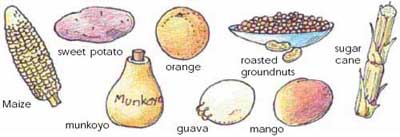
 HOMEWORK
HOMEWORK
Ask your family to give you a snack to take to school.
OR
Prepare a snack at home to take to school.
|
They are going to school. |
Talk about meals at home.
Who usually cooks?
What do
people do before eating?
Where do people eat? Do they all eat
together?
What do they eat with?
What do they do after eating?
Activity 18
Look at the pictures. Does your family eat like this?
|
|
|
 READING
READING
|
Mule’s mother cooks. |
Muke’s aunt cooks. |
|
They all wash their hands in one bowl. |
They wash hands in running water. |
|
The men eat together. |
Everyone eats together. |
|
They have their own plates. |
They all eat from one pot. |
|
Mule cleans the dishes. |
Muke helps his aunt. |
 ASK YOURSELF
ASK YOURSELF
How do I like to eat my food?
How do I like to wash my
hands?
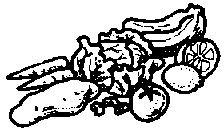
|
EATING AT HOME I like to: |
 REMEMBER
REMEMBER
|
Different people eat in different ways. |
 HOMEWORK
HOMEWORK
Ask your family about good eating habits.
What do they
think?
MESSAGES
Can you remember all the Remember messages?
